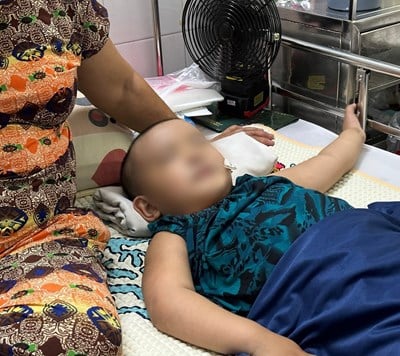Is epilepsy dangerous? Or is epilepsy dangerous, how does it affect health, how is it treated? Can this disease be cured?
Epilepsy is a disease related to the nervous system, caused by abnormalities in brain activity, leading to simultaneous stimulation of a group of nerve cells, creating sudden electrical discharges in the brain.
 |
| The risk of premature death in people with epilepsy can be three times higher than in normal people or people with some other diseases. |
Stimulation of the cerebral cortex in different regions can lead to different epileptic symptoms such as convulsions, stiffening of limbs, sudden absence seizures, etc.
Epilepsy is not a mental illness, because apart from the times when experiencing seizures, the patient can still live, work, and study normally.
An estimated 50 million people worldwide currently suffer from epilepsy, making it one of the most common neurological disorders.
Every year, about 5 million people worldwide are diagnosed with epilepsy. That makes many people wonder if epilepsy is dangerous and can it be cured?
In many cases, epilepsy can be cured if diagnosed and treated promptly and the patient complies with the treatment regimen.
Depending on the case and condition, the doctor will prescribe treatment by using medication, surgery, combined with changes in lifestyle, living habits, diet, etc. The patient can return to normal life.
It is important that people with epilepsy have their condition assessed by a doctor, as there are different types of epilepsy. Generally, the fewer seizures a person has and the milder their seizures and convulsions, the less likely they are to develop serious problems.
The risk of premature death in people with epilepsy can be three times higher than in people without epilepsy or with certain other diseases. People with epilepsy who are not treated or controlled have a higher risk of death than people with treated epilepsy.
People with epilepsy tend to have more physical problems (such as bruises and broken bones due to seizure-related injuries). Epilepsy can put people at greater risk of traffic accidents, falls, head-banging, etc.
It can also lead to some psychological problems such as depression, stress, etc. A small number of people with epilepsy may die from underlying neurological conditions, such as brain tumors.
There have been some people with epilepsy who have died suddenly from unknown causes. This is called Sudden Unexpected Death in Epilepsy (SUDEP) and usually occurs while the person is sleeping.
Many studies have shown that SUDEP is the result of a seizure and occurs mainly in people with difficult-to-treat epilepsy, intellectual disability, tonic-clonic seizures, and a high frequency of seizures. People with epilepsy who often have nocturnal seizures are also at higher risk of dying from SUDEP.
A seizure lasting longer than 5 minutes can be life-threatening and cause permanent brain damage. Children who have had a seizure are at increased risk of dying from seizure-related problems, including SUDEP. This risk is higher in children whose seizures do not remit.
In addition to knowing whether epilepsy is dangerous, each person needs to know how to handle and provide first aid in case someone is found to have epilepsy. You can refer to the following basic first aid steps:
Help people with epilepsy breathe easier by loosening their collars, ties, etc.
Use soft objects to raise the patient's head, and place the patient on his side, avoiding moving the patient to another position. To avoid injury during a seizure, you need to remove objects around the patient.
Do not attempt to “wake up” an epileptic by shaking or screaming, and do not restrain the person during a seizure.
Do not give food or drink to an epileptic patient who is having a seizure to avoid choking or other injuries. Also, do not put anything in the epileptic patient's mouth.
Monitor and record the patient's symptoms during a seizure to notify the doctor or patient.
If the seizure lasts longer than 5 minutes, call an ambulance immediately. If the seizure continues shortly after the end of the seizure, you should also go to the hospital for examination.
Ideally, the patient should go to a medical facility for examination when the seizure ends.
Can epilepsy be cured? According to Dr. Nguyen Phuong Trang, Tam Anh General Hospital, Ho Chi Minh City, epilepsy is a disease that can be treated through methods such as medication, surgery, etc. The sooner the patient begins treatment, the higher the chance of successful treatment.
Anti-epileptic drugs can help control the condition. Many people can return to a normal life after taking the drugs.
In cases where surgery is required to treat epilepsy, patients should avoid delaying treatment, as brain damage can spread, making surgery more difficult.
The question of whether epilepsy is dangerous has been answered, so how can we proactively prevent this disease? Each person can do the following to prevent epilepsy and protect their health:
Implementing adequate perinatal care can reduce the incidence of children born with epilepsy due to birth trauma.
For children with high fever, seeing a doctor, taking medication, and applying methods to lower body temperature to an appropriate level can help reduce the risk of febrile seizures.
Preventing head injuries, such as reducing the risk of falls, traffic injuries, sports injuries, etc., is an effective way to help prevent post-traumatic epilepsy.
To prevent stroke-related epilepsy, you need to take measures to control and prevent high blood pressure, diabetes, obesity, not smoke, and avoid excessive alcohol use.
Central nervous system infections are common causes of epilepsy in tropical climates.
Taking measures to avoid infection and eliminate parasites can reduce the risk of developing epilepsy (e.g., epilepsy due to brain cysticercosis).
Everyone needs to proactively have regular neurological health check-ups to screen and promptly detect abnormalities that can lead to epilepsy.
Source: https://baodautu.vn/benh-dong-kinh-co-chua-duoc-khong-d222807.html


![[Photo] Closing of the 4th Summit of the Partnership for Green Growth and the Global Goals](https://vstatic.vietnam.vn/vietnam/resource/IMAGE/2025/4/17/c0a0df9852c84e58be0a8b939189c85a)

![[Photo] Promoting friendship, solidarity and cooperation between the armies and people of the two countries](https://vstatic.vietnam.vn/vietnam/resource/IMAGE/2025/4/17/0c4d087864f14092aed77252590b6bae)
![[Photo] General Secretary To Lam receives French Ambassador to Vietnam Olivier Brochet](https://vstatic.vietnam.vn/vietnam/resource/IMAGE/2025/4/17/49224f0f12e84b66a73b17eb251f7278)
![[Photo] Nhan Dan Newspaper announces the project "Love Vietnam so much"](https://vstatic.vietnam.vn/vietnam/resource/IMAGE/2025/4/17/362f882012d3432783fc92fab1b3e980)
![[Photo] National Assembly Chairman Tran Thanh Man meets with outstanding workers in the oil and gas industry](https://vstatic.vietnam.vn/vietnam/resource/IMAGE/2025/4/17/1d0de4026b75434ab34279624db7ee4a)
























![[Photo] Welcoming ceremony for Chinese Defense Minister and delegation for friendship exchange](https://vstatic.vietnam.vn/vietnam/resource/IMAGE/2025/4/17/fadd533046594e5cacbb28de4c4d5655)


























![[Video] Viettel officially puts into operation the largest submarine optical cable line in Vietnam](https://vstatic.vietnam.vn/vietnam/resource/IMAGE/2025/4/17/f19008c6010c4a538cc422cb791ca0a1)




































Comment (0)